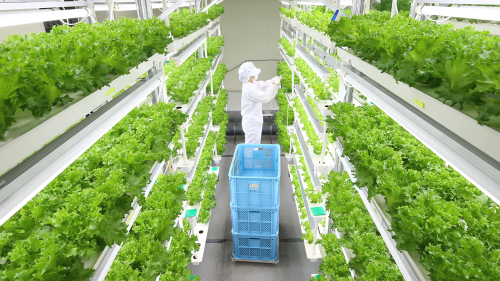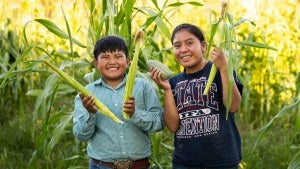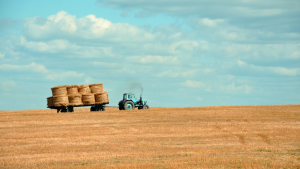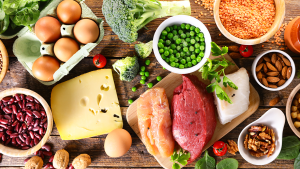Techno-Farming, Recycling Manure, and Cutting Carbon
Check out our roundup of the week's top news and research in food, agriculture, and global development.

Top Story
Bracing for a Climate Catastrophe
Climate change is about to heat up, literally. Temperatures are expected to increase in 2023—reaching at least 1.2 degrees Celsius above the pre-industrial average—and could set record highs in 2024. The agriculture industry will experience sharp repercussions as a result, facing reduced agricultural productivity, disrupted food availability, and declining access to food. Not all hope is lost, however; agriculture has the potential to reduce emissions and improve biodiversity through soil carbon sequestration, no-till cultivation, planting cover crops, and more
Council Insights
Indigenous Agriculture
“Indigenous tribes’ theory of change and regenerative agriculture practices help build just food economies,” writes Leah Altman in Global Food for Thought. “[It] promotes racial equity and supports Indigenous producers as they care for their families, communities, and lands.” Read the full blog.
 Food and Agriculture
Food and Agriculture
Food & Agriculture
Economic Aftermath
Venezuela is experiencing an upward economic shift after eight years of contraction, helping reduce hyperinflation and food shortages. But despite its growth, not everyone is thriving. Many of Venezuela’s industries—especially agribusiness—continue to suffer from the economic collapse, leaving farmers with minimal financial assets as the upper class benefits from the new mild economic liberalization.
Out of Reach Onions
Much like the rest of the world, the Philippines is experiencing rapid food inflation and price hikes, reducing access to a staple food: onions. Costing $4.50 per pound (550 Philippine pesos per kg), onions are now more expensive than beef, which only costs $3.96 per pound. As a key ingredient in almost every Filipino dish, the price hike has widespread ramifications, disrupting people’s lives and changing how they cook.
Techno-Farming
Technological innovation is becoming a key part of the farming industry. In Japan, specifically, farmers are using robots, artificial intelligence, and blockchain-based marketing, among other methods, to improve agricultural sustainability and efficiency. Considering Japan’s aging workforce and the growing global climate crisis, technological advancements for farming could not come at a better time.
Deeper Dive
Why Is Japan’s Workforce Aging?
Japan’s aging population presents new challenges for the agriculture industry and beyond. Due to extended life expectancies and low fertility rates, the number of retired people is outpacing the working-age population, creating major challenges for ensuring financial sustainability of public social expenditures. As a result, the Japanese government has raised the official retirement age to 70 years old
Resilience
Recycling Manure
Northern Ireland’s farm waste is playing a role in decarbonization. With more than three million cows, sheep, and pigs producing over nine million tonnes of manure, Northern Ireland produces a surplus of ammonia—a gas from manure that can damage soil and water—but scientists are breaking down manure into minerals that can be recycled and reused. Minerals specifically used for fuel, energy production, and fertilizer are extracted.
DC Report
Farm Bill Frenzy
The 2018 Farm Bill is set to expire this September, requiring Congress to renew the bill to maintain vital agricultural programs. Congress’s split between Democrats and Republicans presents a challenge that puts the next farm bill into question. A pre-emptive extension of the 2018 Farm Bill’s authority could provide the necessary time to develop transformative farm legislation, rather than sowing distrust and conflict. To learn more about the 2023 Farm Bill, read the Global Food for Thought blog 2023 Farm Bill: Enhancing Agricultural Safety Nets.
 Food and Agriculture
Food and Agriculture
Big Actors
Cutting Carbon
Major agriculture companies are investing millions of dollars into soil carbon sequestration programs to mitigate climate change. Farmers are not completely on board, however; the costs of new farming practices could potentially cause them to lose out on some harvests, temporarily reducing their income. Despite their reluctance, agriculture executives report a high number of farmers signing up for the program, exceeding expectations.
Trade & Commodities
Trade Distortions
Brussels’ Farm to Fork strategy is drawing renewed criticism. Aiming to prioritize sustainability in agriculture by cutting pesticide use 50 percent by 2030, the strategy resulted in a new plan to ban imports of products containing residues of harmful insecticides, creating new trade barriers. Many countries claim the proposal is discriminatory and would lead to trade distortions that disproportionately affect low- to middle-income countries.
Ask an Expert
What role can agriculture play in transforming youth livelihoods in Africa?
"Productive and profitable agriculture and food systems offer an important vehicle for addressing food security and livelihood challenges facing African youth. Growing demand for food and high value agricultural products create enormous opportunities for new investments and job creation throughout the agri-food system in farming, input distribution, agro-processing, and food services, providing direct employment for African youth. Also, given that a majority of African youth are engaged in agriculture, strategies that increase the productivity and profitability of agriculture offer the most powerful means to directly improve youth livelihoods and promote inclusive economic growth food security. Finally, agricultural productivity growth determines the pace of job creation in the off-farm sector because of its strong linkages with the rest of the economy, meaning improved agricultural growth could generate multiplier effects that expand employment opportunities in the whole economy."
— Nonresident Fellow Dr. Kwame Yeboah


Have a question about food and agriculture? Ask one of our experts at the Center on Global Food and Agriculture to get an answer in next week's Global Food for Thought!
Council Events
Did you miss one of our previous livestreams? Don't worry! They are all available on our website to watch at any time.
Other Upcoming Events
Food vs Fuel V2.0: Impacts of Biofuels on Agricultural markets and Food Security
Date: January 24
Time: 9:00 – 10:30 a.m. ET
Taking Stock of Africa’s Agri-Food Processing Sector
Date: February 9
Time: 8:00 – 9:30 a.m. ET
2023 18th Annual Chicago Food Justice Summit
Date: February 8 - 10
Sixth Global Meeting of the Indigenous Peoples’ Forum at IFAD
Date: February 9 - 13
2023 NE Farm to Institution Summit
Date: April 18 - 19
Land Acknowledgement Statement
The Center on Global Food and Agriculture recognizes it occupies the ancestral land of the Kiikaapoi, Peoria, Kaskaskia, Bodwéwadmi, and Myaamia people. Indigenous communities around the world disproportionately experience the pressures of climate change, global conflicts, and the COVID-19 pandemic, while simultaneously stewarding 80 percent of the world’s biodiversity. These Indigenous tribes and nations are the original owners of this land and continue to be systemically erased by policies and practices that ignore their histories. To learn more about Indigenous foodways and practices, check out our 2022 blog series "Stewardship, Sovereignty, and Solutions."
Related Content
- Embracing Dandelions as Food and Medicine
- Going Beyond Regenerative Agriculture on Tribal Lands
- Expanding "638" to Enhance Native American Food Sovereignty
- Flavors and Culture: Food Systems Through Indigenous Women's Eyes
- A Thanksgiving Legacy: Fighting for Indigenous Food Sovereignty
- Native Food Sovereignty: Strengthening Connection to Culture
- Reconnecting to Indigenous Food Sovereignty Values and Practices
- Embracing Interconnectedness: How Indigenous Foodways Can Save Us


